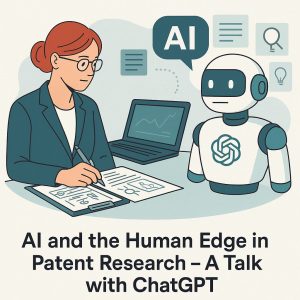
Artificial intelligence is transforming nearly every professional service industry—and patent research is no exception. This raises an important question that many clients and colleagues are asking:
Will AI replace the human element of patent research and analysis? Should businesses be concerned about relying too heavily on machines for such critical work?
The short answer is no—and here’s why. What follows is a conversation-style reflection with ChatGPT, offering perspectives on how AI fits into the future of patent research.
What Does AI Do Well?
To begin with, it’s important to acknowledge where AI shines.
- Speed: Searching across global databases in seconds.
- Breadth: Surfacing documents using advanced language models that recognize synonyms, foreign translations, and technical phrasing.
- Organization: Grouping results, generating summaries, and flagging potential overlaps.
In other words, AI handles the heavy lifting. These capabilities are invaluable in today’s fast-moving IP world because they help ensure that no stone is left unturned.
Where Do Humans Add Value?
However, while AI is powerful, the essence of patent research isn’t just finding documents. It’s interpreting what those documents mean. That’s where human expertise is irreplaceable:
- Contextual judgment: Deciding which results truly matter in a legal, technical, and business context.
- Strategic framing: Crafting reports that answer the client’s real questions—whether that’s invalidity arguments, freedom-to-operate risks, or competitive insights.
- Creativity: Designing clever search strategies that capture obscure concepts AI might overlook.
- Trust: Providing insight, not just information, and standing behind the conclusions with professional credibility.
Put simply, AI provides information, but humans provide wisdom.
Can AI and Human Skills Work Together for an Improved End Result?
Therefore, the most effective approach is not AI versus human, but rather AI plus human.
I/ChatGPT does not see AI as a replacement—I see it as a force multiplier. Our workflow combines the speed and breadth of AI with the judgment and strategy of experienced researchers.
That means:
- Faster results without sacrificing quality.
- Broader coverage with sharper analysis.
- Reports that are not only data-rich but also strategically actionable.
As a result, clients aren’t paying for raw machine output. Instead, they are investing in insights guided by human expertise—delivered more efficiently thanks to AI.
What Do You Think The Future of Patent Research Will Be Like?
Looking ahead, it’s useful to remember a simple analogy: calculators didn’t replace mathematicians, and AI won’t replace patent researchers.
Instead, AI frees professionals to spend less time digging and more time analyzing—where the real value lies. In this new era, the most effective patent research isn’t about human vs. machine, but about human + machine. And that combination is what keeps clients ahead.
A Final Reassurance from PlanetPatent.com
Finally, let’s step back to the original concern. Will AI replace researchers and attorneys entirely? Probably not—at least not any time soon. Perhaps the technology will evolve further, but for now, clients can rest assured that professional oversight remains essential.
When you work with us, you can be confident that your project is not being left to an algorithm. Every search, every analysis, and every recommendation is reviewed and guided by experienced professionals who understand both the law and the business context.
AI makes us faster and more thorough. Human expertise makes us trusted. Together, they ensure you get the best possible results.
For more on this topic, you may be interested in an article published by IPWatchDog:
AI Versus Manual Patent Searching: How a Hybrid Approach Can Optimize Success
We’d also love to hear your perspective: What role do you see AI playing in the future of patent research?
